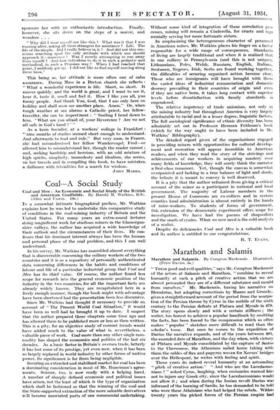Coal—A Social Study
Coal and Men : An Economic and Social Study of the British and American Coalfields. By Harold M. Watkins, B.Sc. (Allen and Unwin. 18s. ) IN a somewhat intimate biographical preface, Mr. Watkins explains how he was led to undertake this comparative study of conditions in the coal-mining industry of Britain and the United States. For many years an extra-mural lecturer doing magnificent work for studious miners in the ,Glamorgan- shire valleys, the author has acquired a wide knowledge of their outlook and the circumstances of their lives. He con- fesses that his dominant interest always has been the human and personal phase of the coal problem, and this I can well understand.
In his survey, Mr. Watkins has assembled almost everything that is discoverable concerning the colliery workers of the two countries and it is as a repository of personally authenticated data concerning differences in the habits and conditions of labour and life of a particular industrial group that Coal and Men has its chief value. Of course, the author found less scope for research into the general economic position of the industry in the two countries, for all the important facts are already widely known. They are recapitulated here in a lively enough manner, though the book might with advantage have been shortened had the presentation been less discursive.
Since Mr. Watkins had thought it necessary to provide an account of " The Present World Coal Situation," it would have been as well had he brought it up to date. I suspect that the author prepared these chapters some time ago and has allowed them to be published more or less as then written. This is a pity, for an objective study of current trends would have added much to the value of what is, nevertheless, a valuable piece of work. Coal more than any other single com- modity has shaped the economics and politics of the last six decades. As a basic factor in Britain'S oversee trade, latterly it has lost some of its prestige, yet even now, when it has been so largely replaced in world industry by other forms of motive power, its significance is far from being negligible.
Securing an extended and stabilized market for coal has been a dominating consideration in most of Mr. Runciman's agree- ments. Science, too, is now' ready with a helping hand. A number of sharply defined economic and political issues have arisen, not the least of which is the type of organization which shall be fashioned so that the winning of the coal and the State-supported extraction of the more saleable derivatives will become associated parts of one commercial undertaking. Without some kind of integration of these correlative pro. cesses, mining will remain a Cinderella, for crusts and rags menially serving her more fortunate sisters.
In emphasizing the heterogeneous character of personnel in American mines, Mr. Watkins places his finger on a factor responsible for a wide range of consequences. Standards of living are largely traditional and when it is realized that in one colliery in Pennsylvania (and this is not unique), Lithuanians, Poles, Welsh, Russians, English, Italians, Scotsmen, Negroes, Irish, Serbs are found working together, the difficulties of securing organized action become clear. Those who are immigrants will have brought with then► the varied ideas of industrial remuneration and domestic decency prevailing in their countries of origin and even if they are native born, it takes long contact with superior levels before dissatisfaction with family standards is engendered.
The relative impotency of trade unionism, not only in the mining industry but throughout America is very largely attributable to racial and in a lesser degree, linguistic factors. The full sociological significance of ethnic diversity has been admirably set out in Professor Herman Feldman's book (which by the way ought to have been included in Mr. Watkins' Bibliography).
The detailed report given of the organizations engaged in providing miners with opportunities for cultural develop- ment and recreation will appear incredible to American readers, and when they read the story of the strivings and achievements of our workers in acquiring mastery over many fields of knowledge, they will surely think the narrator a first-class romancer. Yet, though the canvas is somewhat overpainted and lacking in a true balance of light and shade, the tribute it is meant to convey is well deserved.
It is a pity that the author refrained from giving a critical account of the miner as a participant in national and local government. The majority of Labour members in the present House of Commons are ex-colliers and in certain counties local administration is almost entirely in the hands of mine-workers. To students of forms of government, this extension of the democratic experiment offers scope for investigation. We have had the paeans of rhapsodists and the snarls of cynics. What we now need is the cold analysis of a realist.
Despite its deficiencies Coal and Men is a valuable book and its author is entitled to our congratulations.
R. T. EVANS.






































 Previous page
Previous page